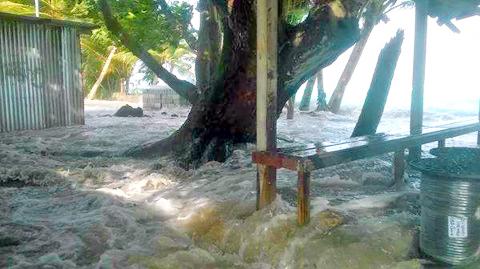Nearly half the population of Tuvalu have been severely affected by the devastation wrought by Cyclone Pam, Tuvaluan Prime Minister Enele Sopoaga said yesterday, with other Pacific island nations also taking a hit.
While the focus has been on devastation in neighboring Vanuatu, Tuvalu — a grouping of nine coral atolls with a population of less than 11,000 — is also struggling to cope, Sopoaga told Radio New Zealand International.
“Forty-five percent of the population of Tuvalu, most of whom are on the outer islands, have been affected, badly, severely affected,” he said of the island chain about 1,550km northeast of Vanuatu. “We are worried about the aftermath in terms of hygiene and supplies of essential materials, like food, medicine and water.”

Photo: EPA
Few details of the impact were given, but Sopoaga said most people living on the outer islands of the diplomatic ally of Taiwan were affected, with houses and crops washed away.
He told the broadcaster there were health and safety concerns after cemeteries were destroyed, adding that government boats were setting off later yesterday to assess the extent of the damage.
Aurelia Balpe, the Fiji-based head of the International Federation of Red Cross and Red Crescent Societies in the Pacific, said there had been extensive flooding in the low-lying nation.
“Tuvalu has had storm surges and up to six of its islands have been affected. People have spoken of four to five meter waves,” she said, adding that “people are hip-high in water.”
“Some houses have fallen over and other infrastructure has been hit, with one hospital destroyed,” she added.
Balpe said other Pacific nations, including the Solomon Islands and Kiribati — also allies of Taiwan — had also been hit.
“Kiribati has also had storm surges,” she said, with the main causeway on the islands badly damaged. “There’s basically one road on the islands and the bridge has been destroyed, which is seriously impacting transport.”
On the Solomon Islands, several houses were razed by landslides.
“It is unprecedented in terms of the number of places impacted, but we have not heard of casualties in the Solomons, Kiribati and Tuvalu at the moment,” Balpe said.
Australian Foreign Minister Julie Bishop said Canberra was responding to a request from Tuvalu, one of the world’s smallest and most remote countries.
“Tuvalu has announced a state of emergency and we are responding to that request with basic supplies, water, sanitation, tents, blankets and food,” Bishop said in Perth, Australia. “In the case of Fiji, Solomon Islands and Kiribati, we understand assessments are being made. The impact is not as great, but we wait to hear.”

MORE VISITORS: The Tourism Administration said that it is seeing positive prospects in its efforts to expand the tourism market in North America and Europe Taiwan has been ranked as the cheapest place in the world to travel to this year, based on a list recommended by NerdWallet. The San Francisco-based personal finance company said that Taiwan topped the list of 16 nations it chose for budget travelers because US tourists do not need visas and travelers can easily have a good meal for less than US$10. A bus ride in Taipei costs just under US$0.50, while subway rides start at US$0.60, the firm said, adding that public transportation in Taiwan is easy to navigate. The firm also called Taiwan a “food lover’s paradise,” citing inexpensive breakfast stalls

TRADE: A mandatory declaration of origin for manufactured goods bound for the US is to take effect on May 7 to block China from exploiting Taiwan’s trade channels All products manufactured in Taiwan and exported to the US must include a signed declaration of origin starting on May 7, the Bureau of Foreign Trade announced yesterday. US President Donald Trump on April 2 imposed a 32 percent tariff on imports from Taiwan, but one week later announced a 90-day pause on its implementation. However, a universal 10 percent tariff was immediately applied to most imports from around the world. On April 12, the Trump administration further exempted computers, smartphones and semiconductors from the new tariffs. In response, President William Lai’s (賴清德) administration has introduced a series of countermeasures to support affected

CROSS-STRAIT: The vast majority of Taiwanese support maintaining the ‘status quo,’ while concern is rising about Beijing’s influence operations More than eight out of 10 Taiwanese reject Beijing’s “one country, two systems” framework for cross-strait relations, according to a survey released by the Mainland Affairs Council (MAC) on Thursday. The MAC’s latest quarterly survey found that 84.4 percent of respondents opposed Beijing’s “one country, two systems” formula for handling cross-strait relations — a figure consistent with past polling. Over the past three years, opposition to the framework has remained high, ranging from a low of 83.6 percent in April 2023 to a peak of 89.6 percent in April last year. In the most recent poll, 82.5 percent also rejected China’s

PLUGGING HOLES: The amendments would bring the legislation in line with systems found in other countries such as Japan and the US, Legislator Chen Kuan-ting said Democratic Progressive Party (DPP) Legislator Chen Kuan-ting (陳冠廷) has proposed amending national security legislation amid a spate of espionage cases. Potential gaps in security vetting procedures for personnel with access to sensitive information prompted him to propose the amendments, which would introduce changes to Article 14 of the Classified National Security Information Protection Act (國家機密保護法), Chen said yesterday. The proposal, which aims to enhance interagency vetting procedures and reduce the risk of classified information leaks, would establish a comprehensive security clearance system in Taiwan, he said. The amendment would require character and loyalty checks for civil servants and intelligence personnel prior to